祈使句
- 格式:ppt
- 大小:821.50 KB
- 文档页数:21


祈使句
祈使句:省略主语(you)用于表达命令、请求、劝告、警告、禁止的句子
1、do型祈使句
肯定:动原+其他listen to the teacher carefully.
否定:Don’t+动原+其他Don’t listen to the teacher carefully
do型祈使句口诀:do型祈使句,它的主语(you)常省去;
表示请求或命令,加上please表客气;
如果变成否定句,使用don’t是规律。
2、be型祈使句
肯定句:Be+形容词例: Be quiet. Be careful.
否定句:Don’t + be + 形容词例:Don’t be quiet.
3、No 型祈使句
No +名词/动名词
No pictures.(名词)禁止拍照。
例:No spitting. No littering. No parking.(禁止泊车)4、Let型祈使句
Let sb(宾语) do sth. 让某人做某事。
Let sb(宾语)not do sth 让某人不要做某事。
Let’s go to school.
Let’s not go to school.。
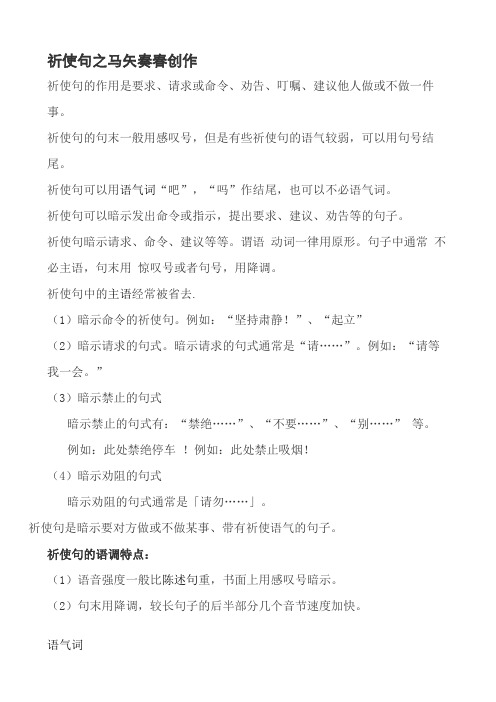
祈使句之马矢奏春创作祈使句的作用是要求、请求或命令、劝告、叮嘱、建议他人做或不做一件事。
祈使句的句末一般用感叹号,但是有些祈使句的语气较弱,可以用句号结尾。
祈使句可以用语气词“吧”,“吗”作结尾,也可以不必语气词。
祈使句可以暗示发出命令或指示,提出要求、建议、劝告等的句子。
祈使句暗示请求、命令、建议等等。
谓语动词一律用原形。
句子中通常不必主语,句末用惊叹号或者句号,用降调。
祈使句中的主语经常被省去.(1)暗示命令的祈使句。
例如:“坚持肃静!”、“起立”(2)暗示请求的句式。
暗示请求的句式通常是“请……”。
例如:“请等我一会。
”(3)暗示禁止的句式暗示禁止的句式有:“禁绝……”、“不要……”、“别……” 等。
例如:此处禁绝停车!例如:此处禁止吸烟!(4)暗示劝阻的句式暗示劝阻的句式通常是「请勿……」。
祈使句是暗示要对方做或不做某事、带有祈使语气的句子。
祈使句的语调特点:(1)语音强度一般比陈述句重,书面上用感叹号暗示。
(2)句末用降调,较长句子的后半部分几个音节速度加快。
语气词祈使句主要依靠语气来表达,有时也借助语气词“吧、啊(呀、哇、哪)”等表达。
例如:找个凳子坐下吧!让他走吧!可得抓紧时间啊!大家快过来呀!你可得好好干哪!种类根据祈使句的语用意义和语气的强弱,祈使句可以分为四类:(1)暗示命令的祈使句暗示命令的祈使句都带有强制性,要求对方必须服从,言辞肯定,态度严肃。
例如:立定!站起来!让他进来!快去救火!(2)暗示请求的祈使句与暗示命令的祈使句相比,暗示请求的祈使句的语气要舒缓一些,可以使用语气词“吧、啊”,主语可以出现,也可以不出现。
例如:请给我们多提意见!您请坐啊!这个问题你来回答吧!帮帮我的忙吧!(3)暗示禁止的祈使句暗示禁止的祈使句明确暗示禁止对方做什么事情,言辞强硬,态度坚决,不必语气词。
例如:别动!禁绝胡说!此处禁绝吸烟!你不要去!谁也不要随便说话!(4)暗示劝阻的祈使句暗示劝阻的祈使句语调比较平缓,经常使用语气词“吧、啊”。
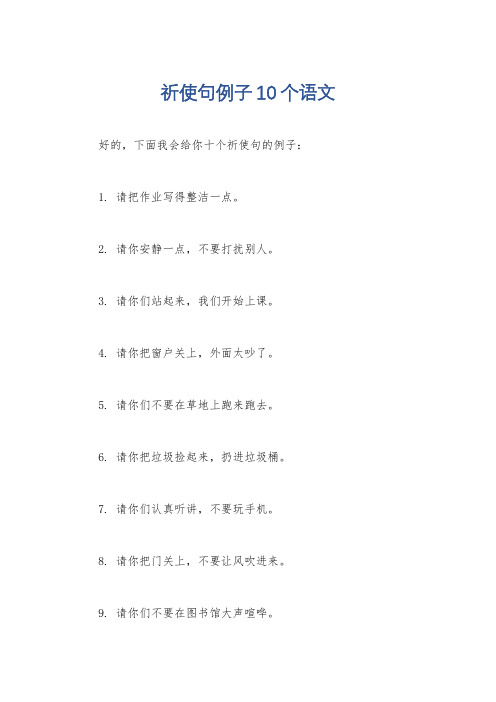
祈使句例子10个语文好的,下面我会给你十个祈使句的例子:
1. 请把作业写得整洁一点。
2. 请你安静一点,不要打扰别人。
3. 请你们站起来,我们开始上课。
4. 请你把窗户关上,外面太吵了。
5. 请你们不要在草地上跑来跑去。
6. 请你把垃圾捡起来,扔进垃圾桶。
7. 请你们认真听讲,不要玩手机。
8. 请你把门关上,不要让风吹进来。
9. 请你们不要在图书馆大声喧哗。
10. 请你把这个问题想一想,然后给我答案。
希望这些例子能够帮到你理解祈使句的用法。
如果你还有其他问题,欢迎继续问我。
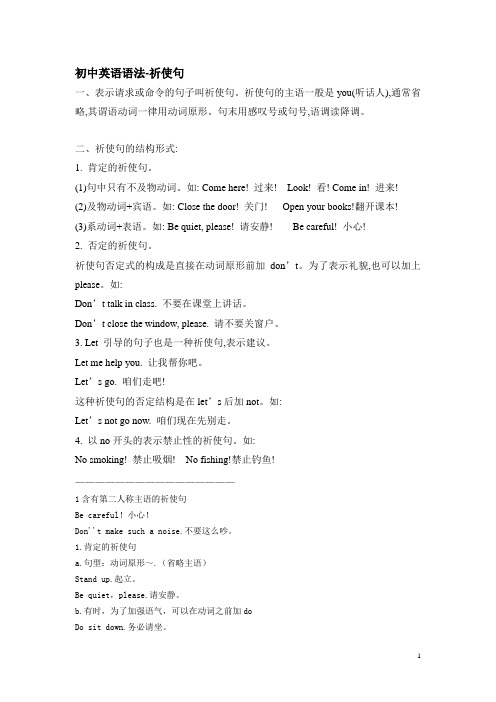
初中英语语法-祈使句一、表示请求或命令的句子叫祈使句。
祈使句的主语一般是you(听话人),通常省略,其谓语动词一律用动词原形。
句末用感叹号或句号,语调读降调。
二、祈使句的结构形式:1. 肯定的祈使句。
(1)句中只有不及物动词。
如: Come here! 过来! Look! 看! Come in! 进来!(2)及物动词+宾语。
如: Close the door! 关门! Open your books!翻开课本!(3)系动词+表语。
如: Be quiet, please! 请安静! Be careful! 小心!2. 否定的祈使句。
祈使句否定式的构成是直接在动词原形前加don’t。
为了表示礼貌,也可以加上please。
如:Don’t talk in class. 不要在课堂上讲话。
Don’t close the window, please. 请不要关窗户。
3. Let 引导的句子也是一种祈使句,表示建议。
Let me help you. 让我帮你吧。
Let’s go. 咱们走吧!这种祈使句的否定结构是在let’s后加not。
如:Let’s not go now. 咱们现在先别走。
4. 以no开头的表示禁止性的祈使句。
如:No smoking! 禁止吸烟! No fishing!禁止钓鱼! ————————————————1含有第二人称主语的祈使句Be careful!小心!Don''t make such a noise.不要这么吵。
1.肯定的祈使句a.句型:动词原形~.(省略主语)Stand up.起立。
Be quiet,please.请安静。
b.有时,为了加强语气,可以在动词之前加doDo sit down.务必请坐。
Do study hard.一定要努力学习。
比较祈使句和陈述句陈述句You sit down.你坐下来。
祈使句:Sit down.坐下(省略主语you)c.用客气的语气表示祈使句时,可在句首或句尾加上please,但如果在句尾加please,那在please之前一定要加一个逗号“,”。

祈使句的作用是要求、请求或命令、劝告、建议别人做或不做一件事。
祈使句的句末一般用感叹号,但是有些祈使句的语气较弱,可以用句号结尾。
祈使句可以用语气词“吧”作结尾,也可以不用语气词。
祈使句可以表示命令、请求、禁止、劝阻等。
表示命令的祈使句例如:“保持肃静!”;“起立!”表示请求的句式通常是“请……”。
例如:“请等我一会。
”表示禁止的句式有:“不准……”、“不要……”、“别……” 等。
例如:「此处不准停车!」表示劝阻的句式通常是「请勿……」。
例如:「请勿在车厢内饮食。
」一、反意疑问句反意疑问句是用来表示向对方提出反问的一种句式.表示说话人对所提问题的答案有所了解.有时不需要得到回答.反意疑问句的结构分为两部分,即:陈述部分和疑问部分(疑问部分用简略形式),陈述部分与疑问部分用逗号隔开.反意疑问句有两种形式,一种是前肯定后否定;另一种是前否定后肯定.如:You are a student , aren't you ? 你是个学生,对吗?You are not a student, are you ? 你不是学生,对吗?应当注意反意疑问句的答语, 与汉语略有区别,特别是前否定后肯定类型的反意疑问句. 例如: -----You are a student, are you ? 你是个学生,对吗?----- Yes, I am . ( No, I am not ) 是的, 我是. (不是,我不是 . )------- You are not a student, are you ? 你不是一个学生,对吗?------- No, I am not .( Yes, I am ) 对,我不是. ( 不对, 我是 . )当陈述部分是复合句时,疑问部分人称和谓语动词一般与主句一致,但是当主句有I ( don't) believe ( think , suppose , guess ... )疑问部分人称和谓语动词应该与从句一致.主句的否定实际上是对从句的否定.例如: I don't think he will come , will he ? 我想他不会回来,对吧?I think he can swim , can't he ? 我想他能游泳,对吧?练习题填词完成反意疑问句1. He wouldn't wait in line the next day ,______ ?2. She has been learning English , _________ ?3. We can't take the books out ,________ ?4. He has to go home on foot , ________ ?5. You haven't had your lunch ________ ?6.We have nothing to eat , ________ ?7.They dislike the book ,________ ?8. There used to be a post office in the street ,________ ?9. He said that he would not go with us ,________ ?10.We must hand in the exercises , ________ ?11.You dare to jump off the wall ,________ ?12. He made a few mistakes in his exercises , ________ ?13 She must be a music lover ,________ ?14.I suppose you know her address ,________ ?15. I don't think you 're serious , ________ ?16.Let us do the jobs by ourselves ,________ ?17. -----He used not to smoke , usedn't he ?----- _____,he used to . The doctor always tole him not to .18. Do the homework by yourselves , ________ ?19 Let's enter the hall ,________ ?20 .You must have seen him yesterday ,________ ?答案1. would he2.hasn't she3.can we4.doesn't he5.have you6.have we7.don't they8. usedn't there9.didn't he 10.mustn't we 11.don' t you 12.didn't he 13.isn't she 14.don't you 15.are you 16.will you 17.Yes 18.will you 19.will you 20.didn't二、祁使句祁使句是用来向别人提出命令,建议或请求的句式.常见的祁使句有以下五种:1) Let's 开头的祁使句如: Let's say it in English .2) 动词原形开头的祁使句. 如: Listen to the teacher .3) Shall I 开头的祁使句 . 如: Shall I carry the parcel for you ?4) Will you 开头的祁使句. 如: Will you come here early ?5) 以Please 开头的祁使句如: Please take a message for him.6)带呼语的祈使句,如:Mary, come down here ! (对mary 讲话,而不带呼语的且以动词原形开头的祈使句则对第二人称讲话)7)不让对方做某事, 英语用" Don't " . 例如:Don't speak loud . 不要大声讲话.Don't write in that way . 不要那样写.练习题翻译下列各句1.咱们一起玩吧!2.请不要迟到.3.回答这个问题.4.我来打开窗户好吗?5.你和我们一起去好吗?答案1. Let's play together!2.Don't be late.3.Answer this question.4.Shall I open the window ?5.Will you go with us ?三、强调句强调句式用来加强语气,强调结构为: It is ( was ) ...(强调部分) that ( who ) ... ( 保留部分), 词结构可以强调除谓语动词以外的任何成分.如: The boy played football on the street .It was the boy who played on the street . ( 强调主语)It was football that the boy played on the street . ( 强调宾语)It was on the street that the boy played football. ( 强调状语)运用强调句型时应注意以下几个问题:1) 当被强调的句子是过去时,强调句型中用was ,被强调的句子是现在时, 强调句型用is2)但强调的部分是人时,强调句型中用who , 其他情况用that3) 但强调谓语动词时,用" do " 动词. 例如: He did finished his homework .他确实完成了作业 .练习题强调划线部分1. I read this book- report only last Saturday .2. I happened not to be in London at that time .3. Master Wu taught us how to run the machine .4.I seem to have heard of the name .5.He joined the army three years ago.答案1.It was this book-report that I read only last Saturday .2. It wasat that time that I happened not to be in London .3. It was Master Wu who taught us how to run the machine .4. It is the name that I seem to have heard of .5.It was three years ago that I joined that army .四、否定句否定句从否定的位置上分为主语的否定,谓语的否定和宾语的否定.例如:Nobody can do such a thing . (主语的否定, 意思为: 没有人能做出这样的事情来.)I can't remember his telephone number. (谓语的否定, 意思为:我不能记起他的电话号码.) He told me nothing . ( 宾语的否定, 意思为: 他什么也没告诉我.)否定句从意义上分为:部分否定和全部否定. 例如:All the girls don't like bright colours .(部分否定.意思为; 不是所有的女孩都喜欢鲜艳的颜色.)= Not all the girls like bright colours . ( 意思同上)None of the girls like bright colours .( 全部否定,意思为:没有一个女孩喜欢鲜艳的颜色)运用否定句应注意的几个问题:1) 否定主语的否定词有: nothing , nobody , no one , none ,no, little , few2)否定谓语的否定词有: not , never , hardly ,scarcely ,seldom3)否定宾语的否定词有: nothing , nobody , none , no , little, few4) 当主语是anything , anybody 时, 谓语动词不能用否定式,如果要否定就要用全部否定. 如: Anybody can't live without air . (错误)Nobody can live without air . ( 正确)5) 部分否定与相应的全部否定部分否定全部否定all ...not = not all noneboth... not = not both neithereverything...not=not everything nothingeveryone ...not=not everyone no one6) no 与not 的区别no是形容词,not 是副词 . no放在名词之前,not 与动词连用.I have no orange . ( 我没有桔汁.)I do not have any orange .( 我没有桔汁.)练习题I. 变为否定句1. He reads English every morning .2.They can swim across the river .3. We have practised the pattens many times.4. It is necessary for him to improve his handwriting .5.I have some bread to eat .6. They are playing basketball.7. The teachers will go to a meeting tomorrow .8. The girls wore the skirts yesterday .9.I think that he is right .e to the party early .答案1. He doesn't read English every morning .2.They can not swim across the river .3. We have not practised the pattens many times.4. It is not necessary for him to improve his handwriting .5.I have not any bread to eat .6. They are not playing basketball.7. The teachers will not go to a meeting tomorrow .8. The girls didn't wear the skirts yesterday .9.I don't think that he is right .10. Don't come to the party early .II. 把下列各句变成全部否定1. Both of the brothers work as farmers .2. All of them are studying hard .3. Either of them can lift the heavy box .4.I can find the lost necklace somewhere.5. Everything is ready .答案1.Neither of the brothers works as farmers .2. None of them are studying hard .3.Neither of them can lift the heavy box .4.I can find the lost necklace nowhere.5.Nothing is ready .III. 根据汉语完成句子1. It is too dangerous _______ . ( 横穿马路)2 . He is _____ fool . ( 绝不傻)3. We told him _______. (不要去那儿)4. The old woman can ________ .( 几乎不能念书)5.There is _______ in the bottle .( 没什么水)答案1.to cross the road2. no3. not to go there4. hardly read5. little water综合练习题I.按要求改写或完成下列各句1. It depends on whether we have enough time . (强调划线部分)2. The students have done everything for the meeting . ( 改为否定句)3.Everyone knows the sports meet will be held tomorrow .(改为全部否定)4. I don't think he can climb up that tall tree ,_______ ? ( 完成反意疑问句)5. Let's _______ time . ( 不浪费时间)6. _____ away my dictionary .( 不要拿走)7.He gave me the newspaper . (强调划线部分)8.There are some computeres in the lab . (改为否定句)9.I know all of them . ( 否定宾语)10. He was at home at six o'clock . (强调划线部分)答案1.It was whether we have enough time that it depends on .2. The students have done nothing for the meeting .3.No one knows the sports meet will be held tomorrow .4. can he5. not waste6.Don't take7.He did give me the newspaper.8.There are any computers in the lab .9.I know none of them .10.It was at six o'clock that he was at home .II. 翻译下列句子(英译汉)1. Be sure to lock the door before you leave the room .2.Take care not to leave anything behind .3.How beautiful the flowers look in the vase !4.She can't be in the dormitory now , can she ?5.You didn't go to the show that night , did you ?No, I didn't .6.It is she who has made much progress .7. Tom did say that he would telephone us about it .8.All the workers are not building the bridge .9.The problem is so difficult that few has worked it out .10. Not both of them should be punished .答案1. 离开房间之前一定要锁好门.2. 当心不要丢下什么东西.3.花瓶里的花看上去多么漂亮啊!4.她现在不可能在宿舍,对吗?5.你那天没有去展览会,对吗?对,我没去.6.是她取得了很大的进步.7.汤姆确实说这事儿要打电话给我们.8.并不是所有的工人都在建桥.9.这个问题如此难以至于每几个人做出来.10.并不是它们两个都该受到惩罚.III .翻译下列句子(汉译英)1. 杯子里没什么水,是吧?2. 他很少按时到家,对吧?3. 一定要写信给我,好吗?4. 你没有完成作业,对吗?不,我完成了作业。

1、概述祈使句(imperative sentence)表命令、警告、提醒、建议、请求、叮嘱、号召等,谓语动词用原形。
主语you通常省略,句末用叹号或句号。
Knock at the door before entering, please.进来时请敲门!(建议)Try some of this juice---perhaps you’ll take it.尝点这种果汁,也许你会要。
(建议)Look out! There is a train coming.注意!火车来了!(提醒)Put your coat at once. We must hurry.立刻穿上衣服。
我们必须快点。
(命令)Give blood if you can and many lives will be saved.如果你能,来献血吧,这会挽救很多人的生命。
(号召)(1)“No+名词或动名词”表示祈使句“No+名词或动名词”结构表示禁止的祈使,一般用于指示、标牌、布告等。
No smoking! 禁止吸烟!No spitting!不准随地吐痰!No litter! 不准乱扔果皮纸屑!No entry!不许入内!No thoroughfare!禁止通行!No scribbling on the wall!墙上不准涂写!No admittance except on business!非公莫入!(2)“have done…”结构表示祈使句这种结构相当于stop doing,意为“禁止”。
有时表示“结束、停止”。
Have done scolding him. 不要再责备他了。
Have done!住手!Have done running!跑完了!(别跑了!)(5)无动词祈使句一般来讲,祈使句都要有动词,但是有些用于口号、告示等的祈使句却是没有动词。
主要有:名词短语;介词短语;名词+代词/副词/形容词;形容词+名词/代词;副词+with等。
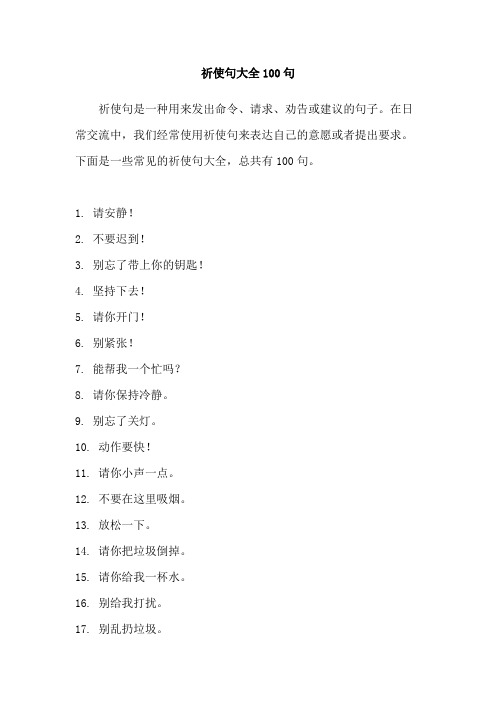
祈使句大全100句祈使句是一种用来发出命令、请求、劝告或建议的句子。
在日常交流中,我们经常使用祈使句来表达自己的意愿或者提出要求。
下面是一些常见的祈使句大全,总共有100句。
1. 请安静!2. 不要迟到!3. 别忘了带上你的钥匙!4. 坚持下去!5. 请你开门!6. 别紧张!7. 能帮我一个忙吗?8. 请你保持冷静。
9. 别忘了关灯。
10. 动作要快!11. 请你小声一点。
12. 不要在这里吸烟。
13. 放松一下。
14. 请你把垃圾倒掉。
15. 请你给我一杯水。
16. 别给我打扰。
17. 别乱扔垃圾。
18. 请你尽快完成任务。
19. 不要担心。
20. 别拖延时间。
21. 请你关上门。
22. 不要挑剔。
23. 别放弃希望。
24. 请你当心点。
25. 不要扔掉这个。
26. 别看手机。
27. 请你合作一下。
28. 不要抱怨。
29. 别为小事生气。
30. 请你静静地等待。
31. 不要随便跑出去。
32. 别忘了电话给我。
33. 请你尽量不要迟到。
34. 不要忘记这个日期。
35. 别放弃梦想。
36. 请你尽快回复。
37. 不要乱说话。
38. 别浪费粮食。
39. 请你把这个送给他。
40. 不要忘记锁门。
41. 别做这个事情。
42. 请你不要打断我。
43. 不要大声喧哗。
44. 别为失败而气馁。
45. 请你好好休息一下。
46. 不要在考试中作弊。
47. 别忘了关掉电视。
48. 请你尊重我的意见。
49. 不要拖延工作。
50. 别让我失望。
51. 请你小心驾驶。
52. 不要给我找麻烦。
53. 别忘了锁车。
54. 请你跟我一起走。
55. 不要惊吓到我。
56. 别在公共场合大声讲话。
57. 请你认真对待这个问题。
58. 不要在房间里抽烟。
59. 别懒散。
60. 请你不要骗我。
61. 不要忘了这个约会。
62. 别在这里停车。
63. 请你好好保重自己。
64. 不要浪费时间。
65. 别犹豫。
66. 请你爱护环境。
67. 不要忽视我的存在。
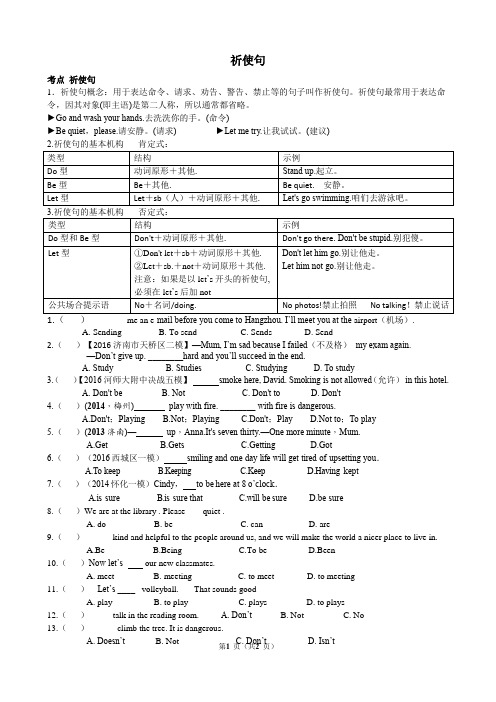
祈使句考点祈使句1.祈使句概念:用于表达命令、请求、劝告、警告、禁止等的句子叫作祈使句。
祈使句最常用于表达命令,因其对象(即主语)是第二人称,所以通常都省略。
►Go and wash your hands.去洗洗你的手。
(命令)►Be quiet,please.请安静。
(请求)►Let me try.让我试试。
(建议)________ me an e-mail before you come to Hangzhou. I’ll meet you at the airport(机场).A. SendingB. To sendC. SendsD. Send2.()【2016济南市天桥区二模】—Mum, I’m sad because I failed(不及格)my exam again.—Don’t give up. ________hard and you’ll succeed in the end.A. StudyB. StudiesC. StudyingD. To study3.()【2016河师大附中决战五模】smoke here, David. Smoking is not allowed(允许)in this hotel.A. Don't beB. NotC. Don't toD. Don't4.()(2014,梅州) play with fire. ________ with fire is dangerous.A.Don't;PlayingB.Not;PlayingC.Don't;PlayD.Not to;To play5.()(2013济南)— up,Anna.It's seven thirty.—One more minute,Mum.A.GetB.GetsC.GettingD.Got6.()(2016西城区一模)smilingandonedaylifewillgettiredofupsettingyou.A.TokeepB.KeepingC.KeepD.Havingkept7.()(2014怀化一模)Cindy,tobehereat8o’clock.A.issureB.issurethatC.willbesureD.besure8.()We are at the library . Please ___ quiet .A. doB. beC. canD. are9.()______ kind and helpful to the people around us, and we will make the world a nicer place to live in.A.BeB.BeingC.To beD.Been10.()Now let’s our new classmates.A. meetB. meetingC. to meetD. to meeting11.()---Let’s ____volleyball. --- That sounds goodA. playB. to playC. playsD. to plays12.()_____ talk in the reading room.A. Don’t B. Not C. No13.()______ climb the tree. It is dangerous.A. Doesn’tB. NotC. Don’tD. Isn’t第1页(共2 页)第2页(共2 页)14.( )buy your ticket from a ticket machine. There are lots of people there.A. NotB. not tooC. Don’tD. Don’t to15.( )—Jim ,____ read books while you are walking in the street. It's very dangerous.—OK ,thank you.A.don'tB.doesn'tC.won'tD.can't16.( )—____ late for school again, Tom!—Sorry, I promise I _________.A. Don’t, willB. Don’t be, won’tC. Don’t be, don’tD. Don’t, won’t17.( )You’re late. ____ late again.A. Don’t be B. Don’t are C. Don’t D. Aren’t18.( )The teacher often says, “ _____ late for school.”A. Don’t B. Don’t be C. Not be19.( )_____ drive too fast .We have enough (足够的)time to get there.A. NotB. Don’tC. doesn’t20.( )【2016江苏宿迁市中考模拟What does the sign mean?A. No parkingB. No photosC. No smokingD. No eating21.( )— ______! You can’t speak loudly in the lib rary. — Sorry, I won’t.A. Let’s goB. No shoutingC. I’m sorry22.( )【2016苏州市吴中区调研测试一】12. Mary, to bring your camera so that you can take photos ofthe beautiful scenery in the countryside.A. remembersB. rememberC. to rememberD. remembering23.( )【2016济南市天桥区二模】51—Mum, I’m sad because I failed my exam again.—Don’t give up. ________hard and you’ll succeed in the end.A. StudyB. StudiesC. StudyingD. To study24.( )【2016河师大附中一测】29. --Mum asks me to remember lots of English words.--She's right. many words and expressions, and you'll find it easy to read articles.A. RememberB. To rememberC. RememberingD. Remembered25.( )【2016河大附中一模】 --you have millions of dollars, what will you do?--I will build a school for the children i n my village.A. SupposeB. SupposingC. To supposeD. Supposed26.( )【2016河师大附中决战五模】 smoke here, David. Smoking is not allowed in this hotel.A. Don't beB. NotC. Don't toD. Don't27.( )【2016新乡市一模】-harder, and you'll do better next time.-OK, I will. I'm looking forwardgood grades.A. Work, to getB. Work, to gettingC. Working, to getD. Working, to getting28.( )【2013安顺】Tom, afraid of speaking in front of people. You are the best one.A.don’tB.notC.not beD.don’t be29.( )【2013南充】 ___________ call me Wang Wang! It’s my dog’s name.A.NotB.NoC.Don’t30.( )【2013济南】—_______ up, Ann. It’s seven thirty.—One more minute, Mum.A.GetB.GetsC.GettingD.Got31.( )【2013扬州】—Jim, ___ read books while you are walking in the street. It’s very dangerous. —OK, thank you.A. don’tB. d oesn’tC. won’tD. can’t32.( )【2013黔东南】_______ hard and you’ll succeed sooner or later.A.StudyB.To studyC.StudyingD.Studied二、根据句意用所给词的适当形式填空。

英语中的祈使句
祈使句是英语中的一种句式,用于表达请求、命令、建议或劝告等。
它通常以动词原形开头,没有主语,例如:
1.Open the door.
2.Don't smoke here.
e and see me.
祈使句的语气通常比较强硬,常用于上级对下级、老师对学生、家长对孩子等场合。
但是,在某些情况下,祈使句也可以用于表达礼貌的请求,例如:
1.Please pass me the salt.
2.Could you help me with this?
需要注意的是,祈使句的否定形式通常是在动词前面加上Don't,例如:
1.Don't run in the hallway.
2.Don't forget to lock the door.
总之,祈使句是英语中一种常用的句式,用于表达请求、命令、建议或劝告等。
它通常以动词原形开头,没有主语,语气比较强硬,但也可以用于表达礼貌的请求。
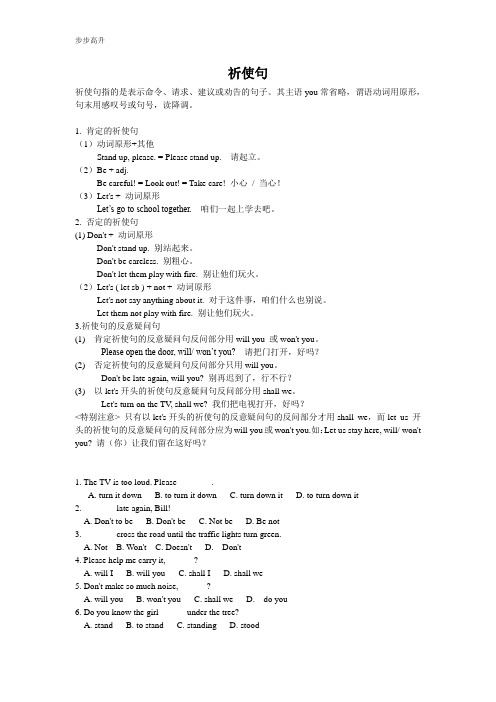
祈使句祈使句指的是表示命令、请求、建议或劝告的句子。
其主语you常省略,谓语动词用原形,句末用感叹号或句号,读降调。
1. 肯定的祈使句(1)动词原形+其他Stand up, please. = Please stand up. 请起立。
(2)Be + adj.Be careful! = Look out! = Take care! 小心/ 当心!(3)Let's + 动词原形Let’s go to school together. 咱们一起上学去吧。
2. 否定的祈使句(1) Don't + 动词原形Don't stand up. 别站起来。
Don't be careless. 别粗心。
Don't let them play with fire. 别让他们玩火。
(2)Let's ( let sb ) + not + 动词原形Let's not say anything about it. 对于这件事,咱们什么也别说。
Let them not play with fire. 别让他们玩火。
3.祈使句的反意疑问句(1) 肯定祈使句的反意疑问句反问部分用will you 或won't you。
Please open the door, will/ won’t you? 请把门打开,好吗?(2) 否定祈使句的反意疑问句反问部分只用will you。
Don't be late again, will you? 别再迟到了,行不行?(3) 以let's开头的祈使句反意疑问句反问部分用shall we。
Let's turn on the TV, shall we? 我们把电视打开,好吗?<特别注意> 只有以let's开头的祈使句的反意疑问句的反问部分才用shall we,而let us 开头的祈使句的反意疑问句的反问部分应为will you或won't you.如:Let us stay here, will/ won't you? 请(你)让我们留在这好吗?1. The TV is too loud. Please________.A. turn it downB. to turn it downC. turn down itD. to turn down it2. _______ late again, Bill!A. Don't to beB. Don't beC. Not beD. Be not3. _______ cross the road until the traffic lights turn green.A. NotB. Won'tC. Doesn'tD. Don't4. Please help me carry it, ______?A. will IB. will youC. shall ID. shall we5. Don't make so much noise, ______?A. will youB. won't youC. shall weD. do you6. Do you know the girl ______under the tree?A. standB. to standC. standingD. stood7. Kate, _______ your homework here tomorrow.A. bringB. bringsC. to bringD. bringing8. ________ me the truth, or I'll be angry.A. TellingB. To tellC. ToldD. Tell9. I've kept the dog _______Maomao for a long time.A. NameB. namedC. namingD. to name10. Don't you know that _______ is good for our health?A. swimB. swimmingC. swamD. swims句型转换11. Will you please read it again more slowly? (改为祈使句)___ read __ __ it __ again more slowly, please.12. If you don't listen to me, I'll go. (改为同义句)_____ _____ me, or I’ll go.13. Let's watch the sports games. (改为反意疑问句)Let's watch the sports games, _____ _____?14. The teachers often tell the students not to be careless. (改为祈使句)_____ _____careless, please.15. Please sit next to Nancy. (改为否定句)_____ _____ next to Nancy.16. Don't forget to turn off the lights, please. (改为反意疑问句)Don't forget to turn off the lights, _____ _____?17. If you move, you'll die. (改为同义句)_____ _____, or you'll die.18. Come to my house tomorrow. (改为反意疑问句)Come to my house tomorrow, _____ _____?19. 这是一个坏了的被子。
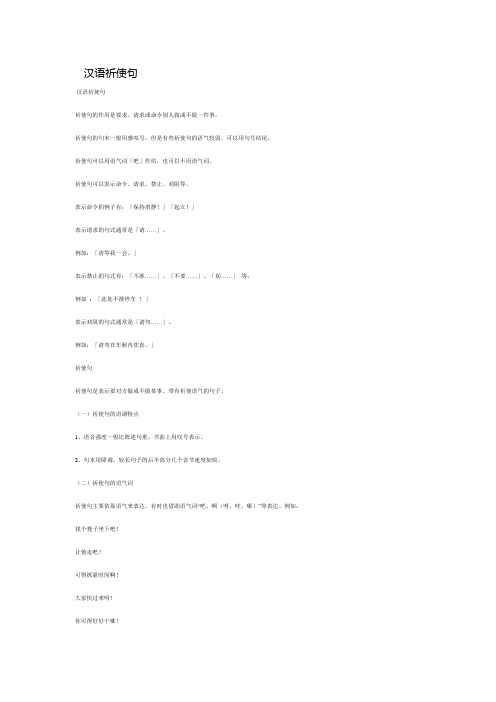
汉语祈使句汉语祈使句祈使句的作用是要求、请求或命令别人做或不做一件事。
祈使句的句末一般用感叹号,但是有些祈使句的语气较弱,可以用句号结尾。
祈使句可以用语气词「吧」作结,也可以不用语气词。
祈使句可以表示命令、请求、禁止、劝阻等。
表示命令的例子有:「保持肃静!」「起立!」表示请求的句式通常是「请……」。
例如:「请等我一会。
」表示禁止的句式有:「不准……」、「不要……」、「别……」等。
例如:「此处不准停车!」表示劝阻的句式通常是「请勿……」。
例如:「请勿在车厢内饮食。
」祈使句祈使句是表示要对方做或不做某事、带有祈使语气的句子。
(一)祈使句的语调特点1、语音强度一般比陈述句重,书面上用叹号表示。
2、句末用降调,较长句子的后半部分几个音节速度加快。
(二)祈使句的语气词祈使句主要依靠语气来表达,有时也借助语气词“吧、啊(呀、哇、哪)”等表达。
例如:找个凳子坐下吧!让他走吧!可得抓紧时间啊!大家快过来呀!你可得好好干哪!(三)祈使句的种类根据祈使句的语用意义和语气的强弱,祈使句可以分为四类:1、表示命令的祈使句表示命令的祈使句都带有强制性,要求对方必须服从,言辞肯定,态度严肃。
例如:立定!站起来!让他进来!快去救火!2、表示请求的祈使句与表示命令的祈使句相比,表示请求的祈使句的语气要舒缓一些,可以使用语气词“吧、啊”,主语可以出现,也可以不出现。
例如:请给我们多提意见!您请坐啊!这个问题你来回答吧!帮帮我的忙吧!3、表示禁止的祈使句表示禁止的祈使句明确表示禁止对方做什么事情,言辞强硬,态度坚决,不用语气词。
例如:别动!不许胡说!此处不准吸烟!你不要去!谁也不要随便说话!4、表示劝阻的祈使句表示劝阻的祈使句语调比较平缓,常用语气词“吧、啊”。
例如:要好好听老师的话啊!你们几个休息一会儿吧!大家都少说几句吧!你们可别拿他开玩笑了!。

祈使句大全祈使句是一种命令句,用于直接表达请求、命令、建议等。
在日常生活和商务沟通中,我们经常使用祈使句来传达自己的意愿和要求。
掌握和运用祈使句能够提高交流的效率和准确性。
本文将为您介绍一些常用的祈使句,希望对您有所帮助。
请求•请打开窗户。
•请帮我一个忙。
•请给我一杯水。
•请稍等片刻。
•请保持安静。
•请告诉我答案。
•请不要打扰我。
命令•马上离开这里!•给我闭嘴!•尽快完成任务。
•不要弄乱这个房间。
•安静下来!•集中注意力。
•停止那个声音!建议•你应该去休息一下。
•为了健康,请多喝水。
•这个问题你最好问专家。
•应该尽早解决这个难题。
•你可以尝试一下新的方法。
•不妨再读一遍这篇文章。
邀请•请你来参加我的生日派对。
•来吧,让我们一起去看电影吧。
•你愿意和我共进晚餐吗?•周末一起去远足如何?•我想请你一起参加公司的年会。
•你愿意成为我的合作伙伴吗?警告•不要试图违规操作。
•提醒你们,加强安全意识。
•这是你最后的机会了,下次要负责后果!•谨慎操作,以免造成损失。
•请注意自己的言行举止。
•禁止在此地吸烟。
鼓励•加油,你一定能够成功的!•对你的表现感到非常满意。
•你做得很好,继续保持!•相信自己,你可以做到!•不要放弃,继续努力。
•做得好!我对你感到骄傲。
忠告•务必按时完成任务。
•最好在考试前进行充分的准备。
•请注意个人隐私安全。
•遵守交通规则是每个人的责任。
•请尽可能与客户保持良好的关系。
•学会管理时间,提高工作效率。
总结以上是一些常见的祈使句,用于不同场景下的交流和沟通。
通过运用适当的祈使句,我们能够更加准确地表达自己的意愿和要求,并能够更好地与他人进行有效的沟通。
希望本文对您有所帮助,能够在日常生活和工作中更加灵活和准确地使用祈使句。

英语语法之祈使句表示要求或命令的句子是祈使句。
祈使句一样用降调,为使祈使句听起来比较婉转,可用低音调,祈使句句末用句号或感叹号。
下面是作者给大家带来的英语语法之祈使句,欢迎大家浏览参考,我们一起来看看吧!初中英语知识点:祈使句祈使句的含义:1. 表要求Pass me the sugar, please. 请把糖递给我。
2. 表命令Put up your hands. 举手。
Fill in this form. 把这个表填好。
3. 表建议Let’s have dinner together. 我们共进晚餐吧。
4. 表邀请Come in and have a seat. 进来请坐。
Help yourself to some fruits. 请吃水果。
5. 表警告Hurry up or you will be late.抓紧点,不然你要迟到了。
Do that again and you”ll be in trouble.要是再干那事,你会有麻烦的。
6. 表制止Don’t touch the exhibits.不要触摸展品。
Don’t play on the ro ad.不要在马路上玩耍。
7. 表嘱咐Be sure to get there before nine. 务必在九点前赶到那里。
Take care not to catch cold. 谨慎别着凉了。
8. 表号令Workers of all countries, unite! 全世界工人阶级联合起来!9. 表庆祝Have a good trip. 祝你旅途愉快。
祈使句句末用句号或感叹号。
祈使句有两种类型:含有第二人称和带有第一、三人称主语的祈使句。
每种类型又有肯定情势和否定情势。
用don’t否定时,只能用其缩略情势。
例如:Welcome to Beijing Park.Walk about three blocks.Don’t mention it.无动词祈使句在要求、命令和口号中,常用无动词祈使句,它实际上是省略了动词,从而使语句更简洁或有力。

英语祈使句定义:祈使句表示请求、命令、建议等等。
谓语动词一律用原形。
句子中通常省略主语(you),句末用惊叹号或者句号,用降调。
1. 肯定的祈使句1)以系动词be开头的祈使句,这种祈使句的常用结构:be+形容词/ 名词Be quiet / quick! 安静些!/快点!Be a good student! 做个好学生!2)以实义动词开头的祈使句,这种祈使句的常用结构为:动词原形+宾语(+其他)。
(省略主语)Come in, please!请进!Please open your books!请翻开书!有时,为了加强语气,可以在动词之前加doDo sit down. 务必请坐。
Do study hard. 一定要努力学习。
3) let型(Let+宾语+动词原形+其他)Let him do it by himself. 让他自己做。
Let me help you. 让我帮助你。
Let’s go to the park. 让我们去公园。
2. 否定的祈使句1)be型(Don’t be +其他成分(形容词、名词或介词短语))Don’t be careless! 别粗心。
Never be late again next time! 下次不要再迟到。
注意:①在这种句型中,be不能省略②否定副词not不可置于be之后2)do型(Don’t +动词原形+其他)Don’t believe him! 别相信他!Don’t worry! 别担心!Never do it again! 不要再这样做了!3)Let引起的祈使句有两种否定形式a. Let+宾语+not+动词原形+其他Let her not do that. 别让她那样做。
Let’s not think about it. It’s only a waste of time.咱们别考虑了。
只是浪费时间。
b. Don’t+ let+宾语+动词原形+其他Don’t let Jim do that. 别让Jim那样做。

祈使句大全祈使句是一种命令或请求的表达方式,用于向听话的人提出要求或建议。
下面是一些常用的祈使句大全,供您参考:1. 请静坐,冥想片刻。
2. 勿忘初心,牢记使命。
3. 爱护环境,共建绿色家园。
4. 保持微笑,对生活更加积极。
5. 珍惜时间,努力追求梦想。
6. 尊重他人,始终保持礼貌。
7. 坚持锻炼,保持健康体魄。
8. 不浪费食物,合理安排饮食。
9. 多读书,扩大知识面。
10. 关心他人,献出一份爱心。
11. 不抱怨困难,积极找寻解决方法。
12. 不说谎,坚守诚实原则。
13. 支持他人,共同成长进步。
14. 学会感恩,珍惜拥有的一切。
15. 肯定他人,增强友善互助精神。
16. 拥抱变化,适应社会发展需要。
17. 尊重长辈,传承中华优秀传统文化。
18. 善待动物,构建人与自然和谐共生模式。
19. 保持乐观,面对困难挑战勇往直前。
20. 学会原谅,释放心灵的负担。
21. 尽力而为,不为结果担忧。
22. 鼓励创新,开拓未来的新坛地。
23. 共享资源,推动可持续发展。
24. 培养爱好,丰富人生内涵。
25. 保持清洁,营造整洁舒适的环境。
26. 尊重个人隐私,维护个人权益。
27. 保护自然,减少环境污染。
28. 抵制不良信息,营造健康网络环境。
29. 放下矛盾,和平解决问题。
30. 孝敬父母,报答他们的养育之恩。
31. 履行承诺,言行一致。
32. 学会分享,共同进步。
33. 尽量减少噪音,关爱他人的休息。
34. 勤俭节约,避免浪费资源。
35. 弘扬友善,传递温暖与善意。
36. 张弛有度,保持工作与休息的平衡。
37. 尊重个人选择,推崇个性发展。
38. 为团队做出贡献,共同实现目标。
39. 坚持梦想,追求人生的价值。
40. 爱护眼睛,保护视力健康。
41. 检查工作,细致入微。
42. 节约用水,保护水资源。
43. 保持微笑,传递快乐与积极。
44. 培养良好习惯,提升个人修养。
45. 笑对生活,积极面对挑战。
46. 心无畏惧,勇往直前。